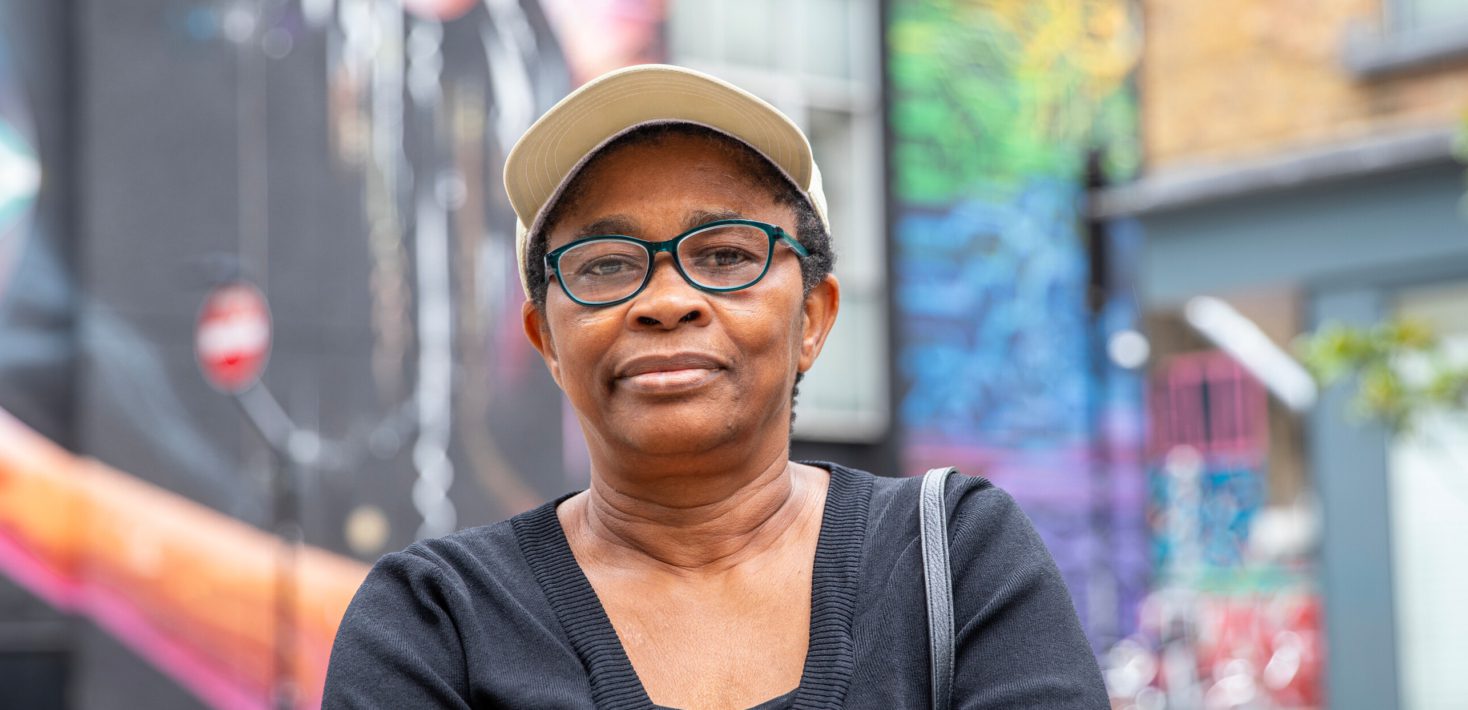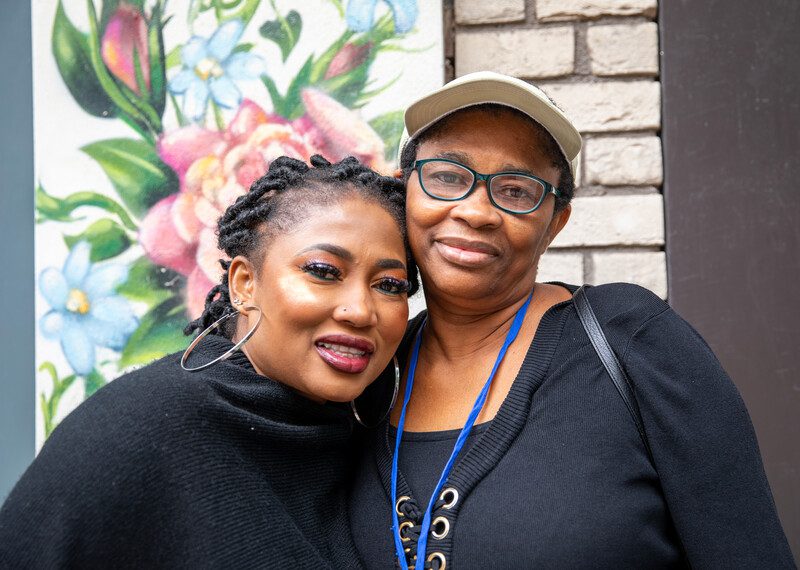
“I will not stop fighting for justice until my husband’s name is cleared”
In the nineties, Shell was determined to make a profit from its operations in the Niger Delta – and no one could stand in its way. The company* urged Nigeria’s military government to deal with environmental protests – knowing full well what that could mean. The military killed and tortured people in a brutal crackdown that culminated in the 1995 sham trial and hanging of nine Nigerian men, including Esther Kiobel’s husband, Dr Barinem Kiobel.
Amidst the devastation, Esther Kiobel, 59, found the strength to take care of her children as well as take on Shell and the Nigerian Government. In 2022, a Dutch court ruled that there was insufficient evidence to prove that Shell had been involved in her husband’s death. Having spent close to 30 years battling the huge oil conglomerate in court, Esther is still seeking justice for her husband – and she won’t stop until his name is cleared.
“My husband, Dr Barinem Kiobel, was executed in November 1995. He was an innocent man, but he died as a criminal. He died because he dared stand up to Shell and the Nigerian Government, using his voice for those who couldn’t.
Our life in Ogoniland, Nigeria, used to be great. People lived happily; fishing and farming our livelihood. But after Shell came to mine oil, they destroyed our land and polluted our rivers.
We tried to speak out, but Shell, together with the Nigerian Government, didn’t want us to have a voice. My husband, a government official at the time, was horrified by what was happening to Ogoniland so he wrote to the Government, explaining the devastation his village was facing.
My husband’s activism eventually led to his imprisonment, where he was jailed along with eight other people. The authorities did not even tell my husband why he’d been locked up, just that he was there for his own for safety. No one thought his life was in danger at that point, that people wanted to kill him – he worked for the government.
Life was brutal
While he was in prison, life was brutal, and my children and I faced constant abuse. I would take food for my husband three times a day as we were afraid the prison food had been poisoned. On one occasion, an army officer saw me. He stopped his vehicle and offered to take me to my husband. Instead, he took me to his office, where he tried to take advantage of me.
When he tried to do it again, I pushed him away, and shouted “no”. After I fought him off, a solider tied me up, threw me into a van and told me he knew 200 ways to kill a person – and that he’d use one on me. I was locked up and while I was away, my 11-year-old daughter had to fetch the food and water. As soon as she was close to the prison, soldiers would throw the water on the floor. When my husband found out what was happening, he went on hunger strike, and I was released.
Soon after his trial had taken place, I started taking food for him again. One day, on my way to my husband, a soldier stopped me. He said, “They’ve taken him this way.” He directed me to a prison yard. As we approached the yard, the military gave me a sign. My friend knew what it meant and turned to me and said, “They have killed them.”
I collapsed and screamed. I didn’t expect the Nigerian government to kill my husband like that. They didn’t even send for me before his execution. When I eventually went to the prison yard, all he had with him was a comb in his hair and the bible. Before he faced the gallows, his last message was: “Tell my wife I love her.”
Before my husband faced the gallows, his last message was: ‘Tell my wife I love her.’
Esther Kiobel
He was executed alongside eight other men – men who didn’t want Shell to destroy their land. After killing my husband, they acidized him and shoved him to a burial ground along with the others. He was a learned man. A man with a PhD.
I still remember the last time I saw my husband alive. He told me about a recent dream where he tried to hold me close, but I pulled away. I was too young to understand what it meant….
After he died, my family and I went to live in a refugee camp. It was hard. My children couldn’t go to school. It wasn’t safe. However, I was lucky enough to meet Amnesty International at the refugee camp. They gave us hope. They gave us a new life. There are people who do not have a voice and need someone to be there for them. I am glad they were there for me.
The importance of human rights
With the support of Amnesty, my family and I eventually moved to America, where a lawyer contacted me keen to discuss a case against Shell. People had seen what happened and wanted to help me take action. Before Amnesty, I didn’t know about human rights, I didn’t know I could take on a corporate giant like Shell. But with the support of Amnesty and the lawyer, I and eight other widows found the strength to take on the case – and I was the one who would take it to court.
My husband was killed like a criminal and all I wanted was for his name to be exonerated – it’s what I still want. My father used to tell me: “A good name is better than gold or silver.” That’s what gave me the strength to fight.
It hasn’t been an easy journey – and it’s a fight that’s far from over. During the court proceedings Shell tried to shut me up so many times, but the more they’ve hurt me, the stronger I’ve become.
Despite everything, I have forgiven Shell. All I want them to do is clean Ogoniland and put a stop to the fighting. My village is ridden with disease because of pollution. People don’t deserve to live like to that. I want them to make everything right.
As for me, I have featured in a documentary called Esther and The Law – it’s an opportunity for me to tell the world my story. People only know part of what happened – but I want the world to know everything that Shell did to my land, my people, my husband and to me. I could have taken Shell’s money, but I said no – because I refuse to stop fighting until my husband’s name is cleared. He was a man that would fight for you – so for me, I just want to prove his innocence. I want his name exonerated.”
Blessing’s story
During the interview, Esther’s daughter Blessing, 42, listened to her mother’s story. She was moved to tears as the memories came flooding back.

“I was 11 when my stepfather was killed. I was forced to grow up and take on a role I wasn’t ready for. Hearing my mother talk about her story is devastating and as horrific as it may sound, I know she’s downplaying what happened. Her husband was killed and the only thing that separated them was a fence.
My dreams of a good education and a better life were shattered in an instant as I was forced to watch my mother try and come to terms with the death of her husband, while looking after five children in a refugee camp.
I am so grateful to Amnesty International – if it wasn’t for this organization, I wouldn’t have a mum. They gave us hope and a new life. And they gave my mother a voice, a platform and the confidence to speak up. Without Amnesty, she wouldn’t have gotten this far in her fight for justice, and she has become so much stronger because of it. My mother moved us to America and started a new job. She is such a strong woman – and that’s given me strength!
Despite all she’s been through, she still wants her voice to be heard. She refused to let this situation break her – and it’s incredible to see her grow in strength, inspire thousands around her and encourage people to speak out against injustice. I am so proud of her.
I want to say a huge thank you to Amnesty – you have been there for me, my family as well as those who are less privileged. We are alive because of you.”
HELP ESTHER CONTINUE HER FIGHT FOR JUSTICE
*Shell denies this allegation. For details of Amnesty’s investigation, as well as Shell’s response see: Amnesty International, A Criminal Enterprise?: Shell’s involvement in human rights violations in Nigeria in the 1990’s















No comments:
Post a Comment